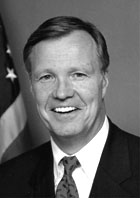Save The Billionaire Short-Sellers!
Rch Karlgaard
Forbes, 24 March 2009
My, oh my. Here is a shocker. James Chanos, the billionaire short-seller, opposes any reforms that would tilt the stock market away from shorting selling. Here is his argument. Not surprisingly, Chanos, whose firm Kynikos means “cynic” in Greek, leaves out all the recent history that has made short-selling so lucrative. Such as:
3. Naked short-selling. Cox’s SEC failed to enforce its own rule against naked short-selling. Again, Wikipedia: “Naked short-selling, or naked shorting, is a type of financial speculation. It is the practice of selling a stock short, without first borrowing the shares or ensuring that the shares can be borrowed, as is done in a conventional short sale. When the seller does not obtain the shares within the required time frame, the result is known as a “fail to deliver.” The transaction generally remains open until the shares are acquired by the seller or the seller’s broker, allowing the trade to be settled. Naked short-selling can be used to manipulate the price of securities by driving their price down, and its use in this way is illegal. … Some commentators have contended that despite regulations, naked shorting is widespread and that the SEC regulations are poorly enforced. The SEC has denied these claims. However, the SEC and others have also defended the practice in limited form as beneficial for market liquidity. Its critics have contended that the practice is susceptible to abuse, can be damaging to targeted companies struggling to raise capital, and has led to numerous bankruptcies.”
Read full article.
 NEW CASTLE, Pa. (WKBN) – A man from New Castle was sentenced in federal court this week on drug trafficking and money laundering charges.
NEW CASTLE, Pa. (WKBN) – A man from New Castle was sentenced in federal court this week on drug trafficking and money laundering charges.
 Christopher Cox was the 28th Chairman of the Securities and Exchange Commission. He was appointed by President Bush on June 2, 2005, and unanimously confirmed by the Senate on July 29, 2005. He was sworn in on August 3, 2005.
Christopher Cox was the 28th Chairman of the Securities and Exchange Commission. He was appointed by President Bush on June 2, 2005, and unanimously confirmed by the Senate on July 29, 2005. He was sworn in on August 3, 2005.